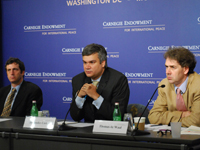Registration
You will receive an email confirming your registration.
Following the 2008 war, the United States has struggled to redefine its relationship with Georgia. While the Bush administration deemed Georgia a “beacon of democracy” and identified it as a key ally, the new administration has changed the rhetoric, stripping Georgia of its special status even as policy has remained largely the same.
Carnegie hosted Columbia’s Alex Cooley and Lincoln Mitchell, authors of the recent report After the August War: A New Strategy for U.S. Engagement with Georgia, to discuss their ideas for the path forward. Carnegie’s Thomas de Waal moderated.
Four Foundations
Cooley and Lincoln argued that in defining their relationship, the United States and Georgia must address four key, interrelated issues.
- The Charter on Strategic Partnership: The Charter, passed in the last days of the Bush administration, usefully institutionalizes the U.S.-Georgia relationship. While both speakers were initially skeptical of it, they agreed that is better than the alternative of an ad hoc strategy. One difficulty remains, however: while Georgia views the agreement as a security commitment, the United States sees it only as a statement of broad security goals.
- Abkhazia and South Ossetia: Cooley and Mitchell cautioned that the situation in Abkhazia—where political autonomy is plausible—is distinct from that in South Ossetia—an isolated region with a small population, limited economic potential, and thus no chance of sovereignty—and U.S. policy toward the two must therefore be separated.
- Democracy: Mitchell explained that democracy is essential for stability in Georgia. From the violent crackdowns on demonstrations to the devastating war to the runs on gas stations for fear of a Russian invasion, recent low-level instability foreshadows the severe instability that is possible if more Georgian viewpoints do not receive political representation.
- Postwar Assistance: Before the 2008 war, U.S. annual assistance to Georgia had averaged $60 to 80 million. After the war, the United States gave Georgia roughly $1 billion. If U.S. assistance returns to pre-war levels now, Georgia, still limited by the effects of the global recession, will have to find other sources of foreign assistance.
Abkhazia
The U.S. goal of preventing Russia’s annexation of Abkhazia should drive its policy, contended Cooley and Mitchell. Engaging with Abkhazia without recognizing its sovereignty is therefore the best strategy. While such a strategy does not guarantee that Abkhazia will return to Georgian rule—Georgia’s ultimate goal—it does keep the option open.
- Non-recognition: Recognizing Abkhazia as a sovereign state would build on the bad precedent set by Kosovo, further weakening the international principle that only republics should be recognized as independent, asserted Cooley. It could also potentially create inconsistency across the international community over which territories are recognized. In addition, recognizing Abkhazia’s sovereignty would legitimize its practice of excluding 200,000 to 250,000 displaced individuals from its political process and would force Georgia to face a greater, more persistent security threat on its border.
- Engagement: The United States can work with the suspicions of the Abkhaz towards Russia by helping the region in status-neutral ways, argued Mitchell. These could include exchange visits, NGO partnerships, and developing the education system.
- Economic Ties: Abkhazia currently depends on Russia for 95 percent of its trade and 40 percent of its government revenue comes from customs on the Russian border. Abkhazia’s economic links to other countries in the region need to be developed, both speakers contended. The people of Abkhazia will support programs to develop their economy if the programs are not framed in terms of conflict resolution or reintegration.
- Georgia’s Approach: Meanwhile, if Georgia hopes to reclaim the territory, it must determine its strategy. Fighting the battle through the international legal system by claiming that Abkhazia is an occupied territory may be right technically but it will not be effective, argued Cooley.
Building Democracy
Solving Georgia’s remaining democratic weaknesses will be very difficult, warned Mitchell. Although Georgia promotes itself as a democracy and its politicians have mastered the rhetoric, they use the tools of democracy to keep an undemocratic government in power. At the same time, the United States has failed to implement substantial democratic policy in the region; technical solutions continue to be applied to political problems.
- Voice Criticism: To ensure that the road to the 2012 parliamentary elections and 2013 presidential election is a smooth one, the United States must be vocal about the lack of democracy in Georgia, asserted Mitchell. Silence from the United States is read as a statement of support.
- Develop Democracy: In addition, the United States should begin its work to develop democratic institutions now and back up its support of democracy’s key elements, including a free press and an independent judiciary.
- Multi-Party System: Given Georgia’s one party majority system, the country has no release valve for political instability, explained Cooley. Individuals must join the party and stay in it if they hope to succeed in politics, while those who try to fund the opposition are blocked. To develop political stability, multi-party dynamics must be encouraged.
Finally, Cooley and Mitchell agreed that the United States must wean Georgia off of its assistance gradually, with slow decreases in aid. At the same time, the United States must recognize the political impact of this assistance, which allows Georgian politicians to reap the political benefits of accomplishments made possible by U.S. money.
